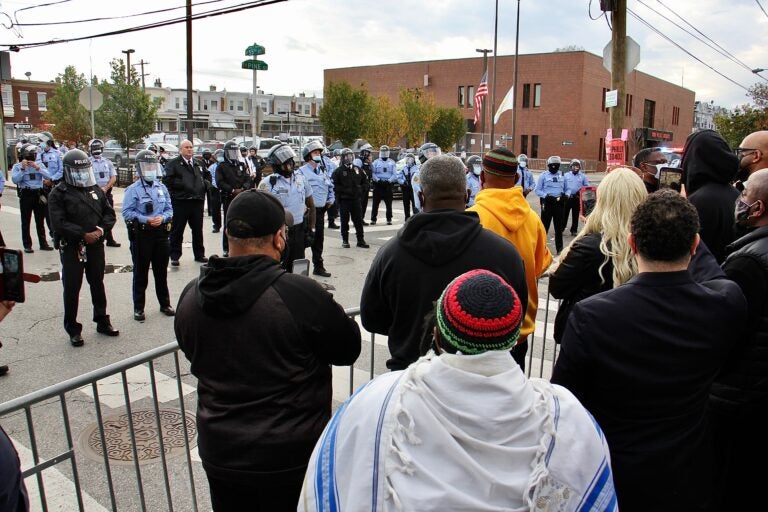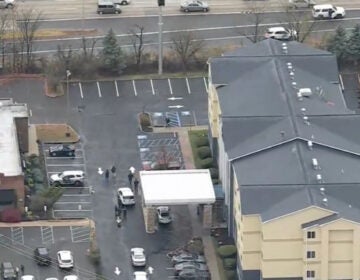Lawyer: Lack of Philly PD mental health training contributed to Wallace’s death
Instead of de-escalating a situation in which an ambulance was sought, officers who arrived escalated it, said the attorney representing Wallace’s family.

Protesters and police gather after the killing of Walter Wallace. (Emma Lee / WHYY)
The family of Walter Wallace Jr. is blaming his fatal shooting at the hands of two city police officers in his West Philadelphia neighborhood Monday, in part, on a broader failure of the department to handle encounters with people experiencing mental health issues.
Video shot by a bystander Monday afternoon shows Wallace advancing toward two officers who responded to reports of a knife-wielding man near a family residence on the 6100 block of Locust Street. As Wallace moved forward, police fired 14 rounds at the 27-year-old man while neighbors looked on and his mother tried to tell police to stop shooting at her son.
Chief Police Inspector Frank Vanore said officers were dispatched in response to calls that Wallace was screaming and that he was armed with a knife, while sources told the Inquirer that police had been called to the house three times that day.
But on Tuesday, lawyers for the Wallace family painted another, more complex picture, saying Wallace’s brother had called 911 hoping to summon an ambulance crew and de-escalate a crisis involving their son, who was suffering from severe mental illness.
Attorney Shaka Johnson, who is representing the Wallace family, said the police officers who ultimately arrived instead escalated a tense situation.
“[Wallace] was on a regimen of lithium, and that says to me he was under doctor’s care … His wife told [police] that he was manic and bipolar,” Johnson said. “Officers who are trained properly should notice certain things when they arrive at a scene. Especially when his wife tells them, ‘Stand down, officers.’”
According to Johnson, police had been on the block on two previous occasions before the fatal encounter. Wallace’s family said they did not call for help the first two times police showed up, but when they did, the family made sure to tell officers Wallace was having a mental health crisis.
Wallace’s brother called for an ambulance, according to family attorney Shaka Johnson. Police got to the home first pic.twitter.com/6WoBcXRxPl
— Ximena Conde (@RadioXimena) October 28, 2020
The family’s description of events echoed other recent fatal encounters with police. Just last month, Lancaster police shot and killed Ricardo Muñoz, a man diagnosed with schizophrenia who lunged at an officer while armed with a knife during what his family described as a psychological episode.
In a press conference Tuesday, police offered few new details about the incident, withholding officers’ body camera footage and information about 911 calls prior to the incident.
But Philadelphia Police Commissioner Danielle Outlaw did say the department was examining whether short staffing of a decade-old plan to employ “crisis intervention teams” –– police armed with Tasers and de-escalation training –– to diffuse such delicate situations had contributed to the Wallace shooting.
“It absolutely figures in,” she said. “We’re not only looking at the shooting, we’re looking at what led up to the shooting. … It’s a part of that evaluation.”
Outlaw also confirmed that the officers who shot Wallace were not equipped with Tasers. She said a purchase order meant to equip all officers with stun devices had stalled. Though the Police Department maintains that fully half the 6,400-person department has taken crisis intervention training, police administration sources said that, in practice, commanders often struggled to staff these positions, especially in busy districts.
Just a month before Wallace’s death, the Police Department announced yet another mental health program: a partnership with the city’s Department of Behavioral Health and Intellectual disAbility Services that would place a behavioral health expert in the radio room with 911 dispatchers and develop a system for flagging emergency calls that might have a mental health risk. Ultimately, the goal would be to scale up the system so that a behavioral health expert would be deployed on scene alongside an officer, a technique known as ‘co-response’ that is becoming more popular in cities nationwide, such as Los Angeles.
Outlaw said Tuesday that the behavioral health expert was not present in the radio room when a call about Wallace came in. She described the effort as still in its infancy.
“We really got some momentum in the last couple months to determine what types of calls we should be responding to,” the commissioner said. “We are currently evaluating how we bring these programs together.”
National research shows law enforcement has a high rate of contact with individuals with serious or moderate mental illness, individuals who comprise 27% of people arrested three or more times. Francis Healy, a special adviser to Outlaw, said police in many jurisdictions struggled with a sometimes unwanted role as the de facto first responders to mental health crises.
“We are the only people available 24/7, so people call us for anything and everything. And we’ve accepted that responsibility, but oftentimes we may not be the best response,” he said in an interview earlier this month. “The ability to have alternates and be able to be the second chair when responding to these incidents I think would have a great deal of impact in de-escalating them.”
The idea is not without controversy. Experts are concerned about placing so much responsibility for responding to behavioral health crises in the hands of the police in the first place.
“There’s a longstanding concern about net-widening. That some of the coercive model of law enforcement might seep over into the public health response and you’ll provide more potential ways for people to get caught up and more ways for behavior to get criminalized,” said Evan Anderson, a public health and criminal justice researcher at the University of Pennsylvania.
Anderson said that the 911 dispatch system nevertheless remains the fastest way to deploy assistance in an emergency situation, and that when rolled out properly, programs like the partnership between the Police Department and the Department of Behavioral Health and Intellectual disAbility Services show promise.
Johnson said it was clear to Wallace’s surviving kin that the status quo wasn’t sufficient.
“The folks who called the authorities didn’t deem the police necessary, which is why they called and specifically requested an ambulance,” he said. “That says, to not only the dispatcher but the dispatcher putting that out over the airwaves, to anyone listening, this is a medical crisis.”

Get daily updates from WHYY News!
WHYY is your source for fact-based, in-depth journalism and information. As a nonprofit organization, we rely on financial support from readers like you. Please give today.









